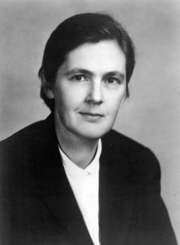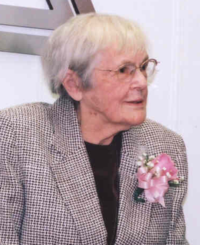Frances Oldham Kelsey
2007 Schools Wikipedia Selection. Related subjects: Human Scientists
| Frances Oldham Kelsey | |
|---|---|
| Born | 24 June 1914 Cobble Hill, British Columbia |
| Occupation | Physician, FDA |
| Spouse | Fremont Ellis Kelsey |
Frances Oldham Kelsey, Ph.D., M.D., (b. 24 June 1914) is a naturalized American pharmacologist, most famous as the reviewer for the U.S. Food and Drug Administration (FDA) who refused to authorize thalidomide for market because she had concerns about the drug's safety. Her concerns proved to be justified when it was proven that thalidomide caused birth defects. Kelsey's career intersected with the passage of laws strengthening the FDA's oversight of pharmaceuticals.
Birth and education
Born Frances Kathleen Oldham in Cobble Hill on Vancouver Island, British Columbia. Kelsey graduated from high school at age 15, and enrolled at McGill University to study pharmacology. At McGill she received both a B.Sc.(1934) and a M.Sc.(1935) in pharmacology, and "on [a] professor's urging, wrote to EMK Geiling, M.D., a noted researcher [who] was starting up a new pharmacology department at the University of Chicago," asking for a position doing graduate work. Despite Geiling assuming that Frances was a man, she accepted the position and began working for Geiling. During her second year, Geiling was retained by the FDA to research unusual deaths related to sulfanilamide. Kelsey assisted on this research project, which verified that sulfonamide (diethylene glycol in Elixir Sulfanilamide) had caused 107 deaths (including many children). The next year, the United States Congress passed the Federal Food, Drug, and Cosmetic Act of 1938. That same year Kelsey successfully completed her studies and received a Ph.D. in pharmacology at the University of Chicago in 1938. Kelsey's work for Geiling is credited with her interest in teratogens, drugs that cause congenital malformations.
Early career and marriage
Upon completing her Ph.D., Kelsey joined the University of Chicago faculty. In 1942, like many other pharmacologists, Kelsey was looking for a synthetic cure for malaria. As a result of these studies, Kelsey learned that some drugs do pass through the placental barrier. While there she met and married, in 1943, fellow faculty member Dr. Fremont Ellis Kelsey.
While on the faculty at the University of Chicago, Kelsey received an M.D. She supplemented her teaching with work as an editorial associate for the American Medical Association Journal for two years. Kelsey left the University of Chicago in 1954, and decided to take a position teaching pharmacology at the University of South Dakota, and moved with her husband and two daughters to Vermillion, South Dakota where she taught until 1957.
Work at the FDA and thalidomide

In 1960, Kelsey was hired by the FDA in Washington, DC. At that time, she "was one of only seven full-time and four young part-time physicians reviewing drugs" for the FDA. One of her first assignments at the FDA, was to review the drug thalidomide. She withheld approval for the drug , although it had already been approved in over 20 European and African Countries, and requested further studies. Despite pressure from thalidomide's manufacturer, Kelsey persisted in requesting additional information to explain an English study which documented a nervous system side effect.
Kelsey's instincts that drugs should be fully tested prior to approval proved to be prescient in a dramatic way when the births of deformed infants in Europe were linked to thalidomide ingestion by their mothers during pregnancy. Researchers discovered that the thalidomide crossed the placental barrier and caused serious birth defects in infants. She was hailed on the front page of The Washington Post as a heroine for averting a similar tragedy in the US. Morton Mintz, author of The Washington Post article, said "[Kelsey] prevented ... the birth of hundreds or indeed thousands of armless and legless children." The public outcry was swift and the Food, Drug, and Cosmetics Act Amendments of 1962 were passed unanimously by Congress. The drug testing reforms required "stricter limits on the testing and distribution of new drugs" to avoid similar problems. The amendments also, for the first time, recognized that "effectiveness [should be] required to be established prior to marketing."
As a result of her efforts to prevent the approval of thalidomide, Kelsey was awarded the President's Award for Distinguished Federal Civilian Service by President John F. Kennedy, becoming the second woman to receive that award.
Continued work at the FDA
After receiving the award, Kelsey continued her work at the FDA. There she played a key role in shaping and enforcing the 1962 Amendments. She also became responsible for directing the surveillance of drug testing at the FDA. Kelsey finally retired from the FDA in 2005, at age 90, after 45 years of service.
In 2005, the FDA honored Kelsey by naming one of their annual awards after her. In announcing the awards, Centre Director Steven K. Galson, M.D., MPH, said “I am very pleased to have established the Dr. Frances O. Kelsey Drug Safety Excellence Award and to recognize the first recipients for their outstanding accomplishments in this important aspect of drug regulation.”
Awards
- 1962 • President's Award for Distinguished Federal Civilian Service
- 1963 • Gold Key Award from University of Chicago, Medical and Biological Sciences Alumni Association
- 2000 • Inducted into the National Women's Hall of Fame
- 2001 • Named a Virtual Mentor for the American Medical Association
Legacy
The Frances Kelsey Secondary School in Mill Bay, British Columbia is named in her honour.

